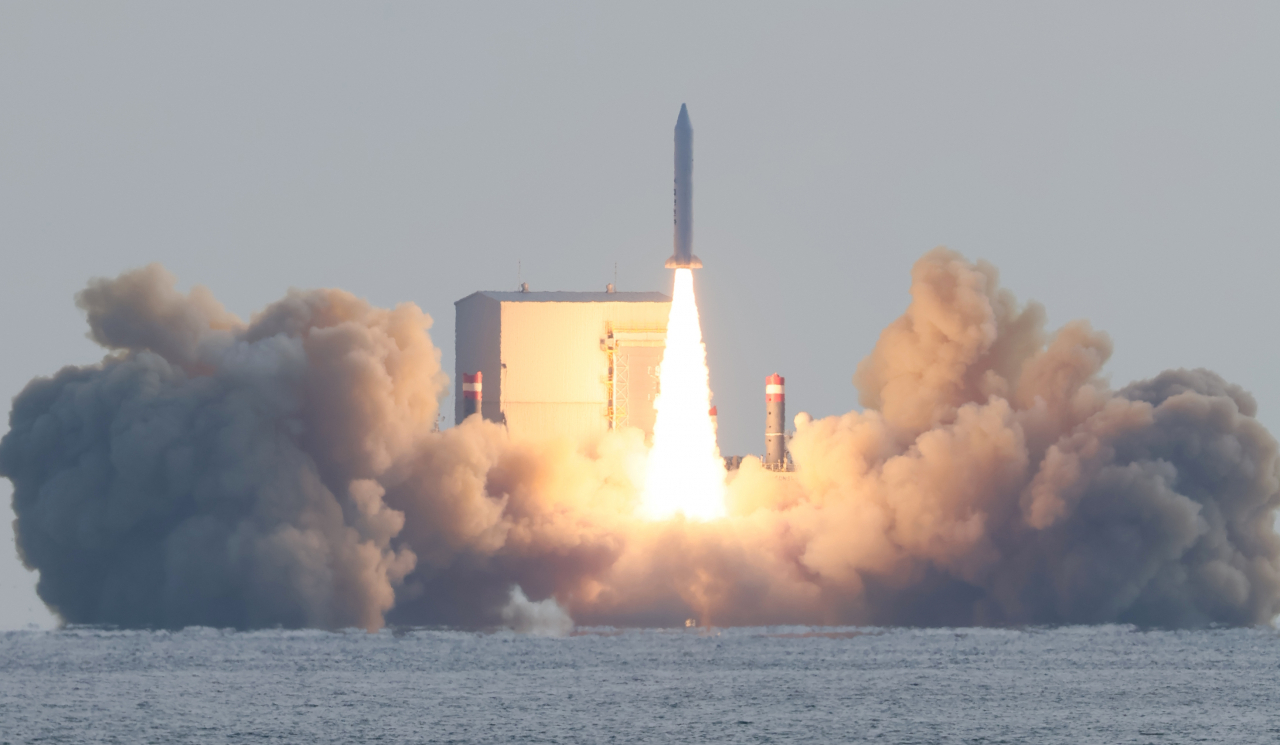S. Korea successfully tests solid-fuel space rocket
Seoul moves to launch solid-fuel, four-stage space rocket in 2025
By Ji Da-gyumPublished : Dec. 4, 2023 - 15:19

South Korea successfully launched a solid-fuel space rocket carrying a small commercial satellite in the final round of tests for an actual launch planned for two years later, according to the Ministry of National Defense on Monday.
The test launch was conducted at around 2:00 p.m. from a barge located in waters south of Jeju Island. It was the first instance of the country integrating an operational satellite, not a dummy satellite, into the developmental phase of a solid-fuel space rocket.
Monday also marked the third test in a series, following previous tests in March and December 2022. This event serves as the conclusive trial leading up to the actual launch of a solid-fuel, four-stage space rocket planned for 2025.
"The launch is of great significance as it showcases the core achievements in the technological development of a solid-propellant launch vehicle," the ministry said in a statement.
The statement further elaborated that the launch successfully validated "a majority of the core technologies, encompassing the performance assessment of each stage's propulsion system."
The Defense Ministry underscored that the "military has taken a step closer toward acquiring space capabilities that enable the independent and swift deployment of small satellites into low Earth orbit."
The ministry said the launch has security implications for South Korea, "considering North Korea's persistent security threats including the launch of a reconnaissance satellite in violation of UN Security Council resolutions."
"The successful launch of the solid-fuel space launch vehicle holds significant importance as it will contribute to accelerating the acquisition of space-based reconnaissance and surveillance capabilities, integral to the Korean-style three-axis defense system."
The case also marks the first collaborative partnership between the South Korean government and the private sector in launching a privately developed satellite utilizing state-developed launch technologies, according to the Defense Ministry.
The solid-fuel space launch vehicle, developed by the state-run Agency for Defense Development, was outfitted with a small satellite manufactured by Hanwha Systems, a major defense contractor in South Korea. The launch also incorporated the ADD's orbital entry technology.
"Given the timely development of a privately produced satellite, we observe a win-win partnership between the private sector and the agency," an official from the Defense Ministry said on condition of anonymity during a closed-door briefing.
"The company can validate satellite performance in space by integrating it into a space launch vehicle. Additionally, the agency can confirm the deployment performance of the satellite for the space launch vehicle."
The small satellite, equipped with synthetic aperture radar or SAR, successfully transmitted its initial signal to a ground control center in the city of Yongin, Gyeonggi Province, at around 3:45 p.m. after achieving the targeted orbit, according to Hanwha Systems.
The satellite also successfully engaged in mutual communications with the ground control center at around 5:38 p.m., the company said.

A solid-fuel space launch vehicle has advantages in terms of operability, responsiveness and reliability.
"With the completion of the development of a solid-propellant space launch vehicle, our military will possess the capability to timely launch small satellites for observation and reconnaissance, addressing security demands and responding to emergencies," the Defense Ministry said.
Solid-fuel rockets can be stored for an extended period with minimal propellant degradation. This feature enables South Korea to continuously produce and store solid engines, thereby facilitating proactive preparation to address security demands in advance.
Its straightforward design not only contributes to a relatively short launch preparation time, but also enhances responsiveness by allowing launches with minimal support equipment. The simple propulsion structure also ensures the excellent reliability of the components.
South Korea will "have the capability to launch satellites with a payload capacity ranging from 500 to 700 kilograms into low Earth orbit."
Plans involve the development of technology to further increase payload capacity up to 1,500 kilograms.
A solid-propellant space launch vehicle boasts a simple structure, facilitating easy storage, handling and cost-effective, swift launches. This makes it ideal for deploying lightweight satellites for observation and reconnaissance in low Earth orbit.
In contrast, a liquid-fuel launch vehicle, with its complex components, presents challenges in handling and higher costs. Nevertheless, its efficient fuel utilization makes it well-suited for transporting substantial payloads. This is particularly advantageous for launching Earth geostationary orbit satellites or space probes into high-altitude orbits.
The Defense Ministry also announced plans to enhance the payload capacity of its solid-fuel space launch vehicles, aiming to integrate them into the ongoing project of launching military spy satellites, dubbed the "425 Project."
"The current focus of solid-propellant space launch vehicle technology development is on launching small-scale projectiles. Plans involve exploring options for coordinating subsequent military satellite projects once the technology for large solid-propellant launch vehicles is secured," the ministry said.
"Anticipated future expansion of payload capabilities suggests that solid-propellant launch vehicles will have the capacity to launch satellites of the 425 satellite-class, including medium to large satellites."



















![[Today’s K-pop] Treasure to publish magazine for debut anniversary](http://res.heraldm.com/phpwas/restmb_idxmake.php?idx=642&simg=/content/image/2024/07/26/20240726050551_0.jpg&u=)